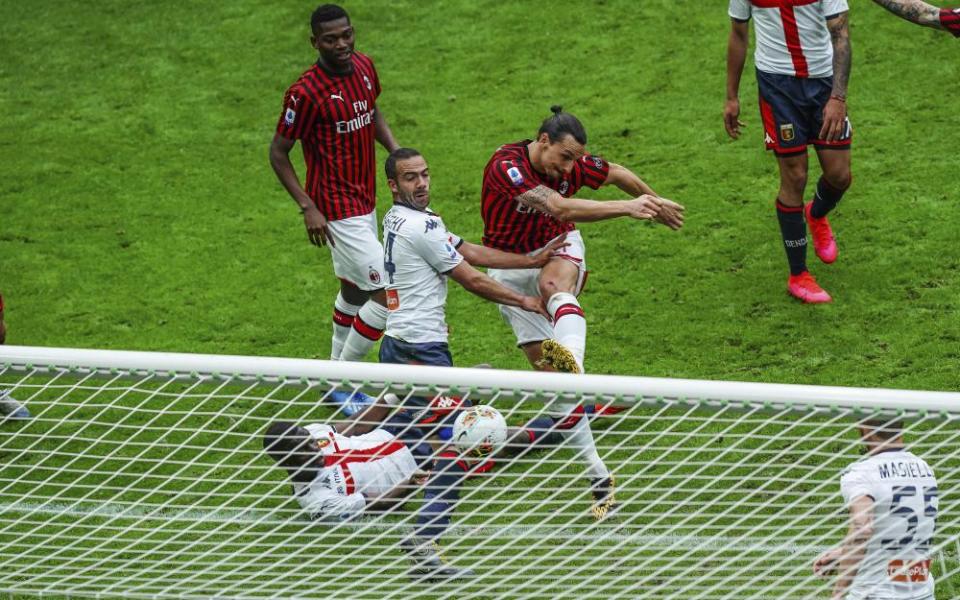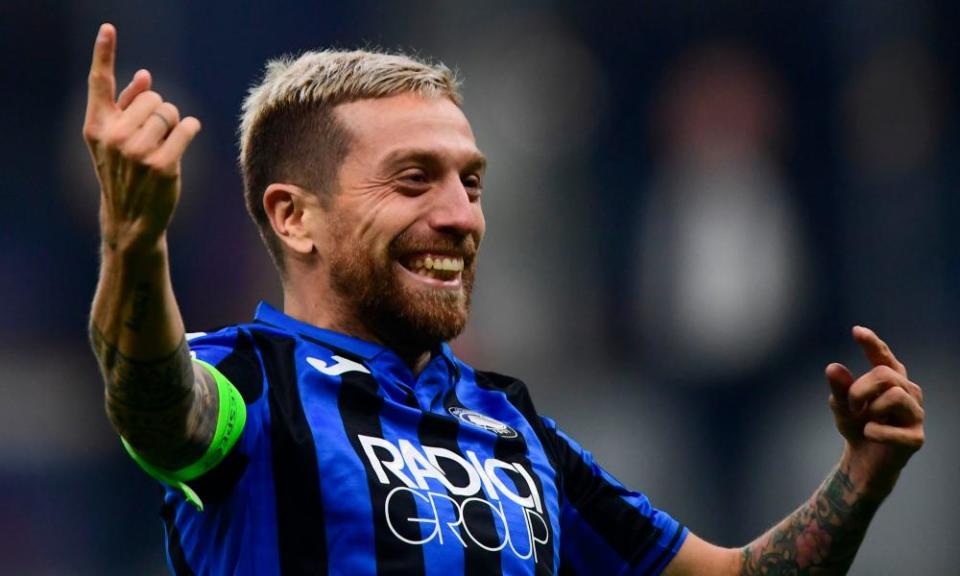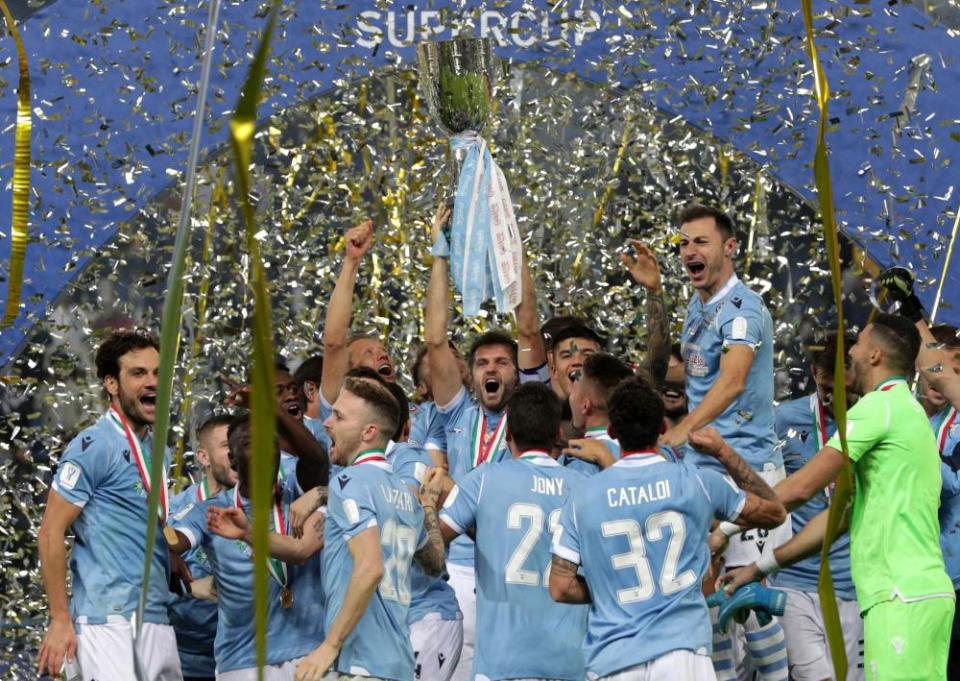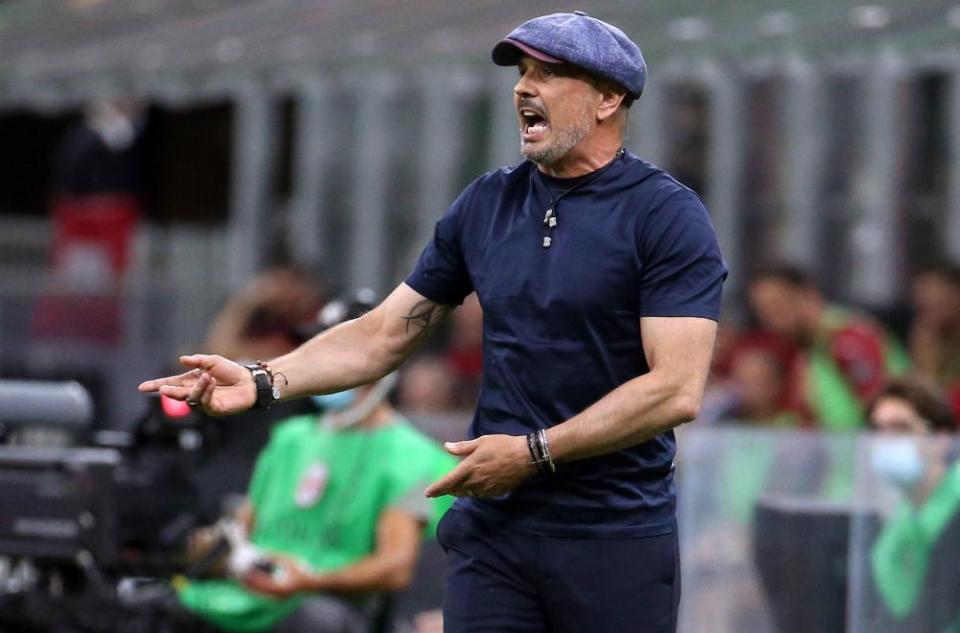It’s the Bandinis 2020! The complete review of Serie A's 2019-20 season
Does it even make sense to consider the 2019-20 Serie A season as a single competition? For the purposes of the standings, sure, it was practical to combine results from before and after Italy’s coronavirus lockdown, allowing a champion to be crowned and the essential details of relegation and European qualification to be worked out.
Reflecting on the football itself, though, it feels more realistic to acknowledge that there were two seasons, each with its own distinct narratives, either side of the enforced pause. The first was characterised by one of the most compelling title races Serie A has known in a decade or more.
Related: Sarri drinks in first Serie A title but his Juventus are yet to 'win and convince' | Nicky Bandini
There were not just two teams in the running but three. Antonio Conte’s Inter started out as the obvious challengers to Juventus and had their noses in front by mid-September. They did again in December, but lost ground as the winter progressed, slipping beneath the downpour from what Conte described as their very own ‘Fantozzi cloud’. Lazio were the opposite: slow out the blocks but unrelenting in their pursuit. They went 21 games unbeaten and, at the time when play was suspended, had won 16 of the previous 18. Although still one point behind Juventus, they had beaten them twice in December – in Serie A, then the Supercoppa – by identical 3-1 margins.
Simone Inzaghi’s side boasted the most prolific striker in the league, Ciro Immobile, and the stingiest defence as well. Luis Alberto and Sergej Milinkovic-Savic were both in a state of grace, the understanding between them bordering on telepathic.
We will never know whether that Lazio side could have sustained a challenge. The version which competed in Serie A’s second season was simply not the same. Lazio had been unbeaten at the Stadio Olimpico, with a +29-goal difference from 14 games there. They lost 3-0 to Milan in their second home game back after the restart. The structure of the summer tournament favoured Juventus. With 124 games crammed into a span of 44 days, the richest teams, with the deepest squads, were at a natural advantage. Still, it was most often the same two players, Cristiano Ronaldo and Paulo Dybala, grabbing the goals that kept them on track for a ninth consecutive Scudetto win.
There was vindication here for Maurizio Sarri, whose appointment was questioned by many, and who could scarcely have imagined such glory himself when he left his job at a bank to follow his passion two decades ago. By the end, though, it felt like victory by default. The teams who had challenged Juventus before the lockdown were not the same ones thriving afterward. If there truly were two seasons, then Milan would have won the second one – taking 30 points from 12 games. In the actual standings, that was only enough to drag them up to sixth.
Stefano Pioli was supposed to only be keeping a seat warm for Ralf Rangnick but instead made himself unsackable as he unleashed the potential of Ismaël Bennacer, Franck Kessié and Ante Rebic. One of Serie A’s youngest squads was upgraded, too, by the goals and experience of a 38-year-old Zlatan Ibrahimovic.

Only Atalanta had as many points after the restart, but they played one game more. The Bergamo club stood apart for their consistency across both “seasons”: a remarkable feat when you consider the financial realities but also the fact that they had found themselves at the centre of Italy’s coronavirus outbreak.
They were ridiculously entertaining. Atalanta scored seven goals on three separate occasions and had back-to-back 5-0 wins against Parma and Milan either side of the new year. Josip Ilicic was spectacular, Duván Zapata unerring and Papu Gómez apparently on a one-man mission to see how many goals he could precede with a nutmeg. Could they have won the Scudetto, if it weren’t for Serie A’s unpopular interpretation of the handball law, which allowed Juventus to snatch an undeserved draw from their meeting in Turin? Once again, we will never know. A record 186 penalties were awarded in Serie A – 46 more than the previous high mark.
There are greater problems than handball laws, though, for Italy’s footballing authorities to wrestle with. The season before lockdown was marred by repeated instances of racism. Romelu Lukaku, Kessié, Mario Balotelli, Dalbert and Rolando Vieira were each targeted with monkey chants. The responses to these incidents was sometimes just as grim as the abuse itself. Inter’s Ultras wrote an open letter to Lukaku arguing that what he had experienced in Cagliari was not racism at all. When Balotelli kicked a ball at his abusers in Verona, the opposition manager, Ivan Jurić, flatly – and wrongly – denied that such chants had occurred.
Related: Inter’s Romelu Lukaku is the latest victim of ultras’ warped loyalty | Nicky Bandini
Then there was Corriere dello Sport’s horrifically ill-judged ‘Black Friday’ headline. Faced with an international backlash, the newspaper claimed to have been subjected to a ‘lynching’. Serie A launched an anti-racism campaign with artwork featuring three monkeys. That news cycle was interrupted by the pandemic. There are no racist chants in empty stadiums. We can only hope, if and when they start to fill up again next season, that some lessons have been learned.
Goal of the season
7) Josip Ilicic from the halfway line.
6) Annual overhead kick entry, this year from Federico Bonazzoli. (Honourable mention: José Callejón)
5) Miguel Veloso’s strike against Juventus was brilliant on its own merit, but the fact that it followed directly after his team hit the woodwork, twice, from a penalty somehow made it even better.
4) To borrow a phrase from the excellent Ultimo Uomo website, “Cristiano Ronaldo, cristianoronaldoing”.
4b) Radja Nainggolan, radjanainggolaning.
3) Jérémie Boga, stealing Tomas Rincón’s soul before picking out the top corner from 30 yards.
2) Fabio Quagliarella: 37 years old and still striking volleys as sweetly as anyone on the planet.
1) Adrien Rabiot barely left a mark in his first 12 months at Juventus. But when he finally did show up …
The Ruslan Malinovskiy Medal for just absolutely leathering it
Miss of the season
Most cursed
The Lecce goalkeeper Gabriel, who managed to concede this penalty and this own goal in the same season.
Team of the season
(3-4-1-2) Wojciech Szczesny; Chris Smalling, Francesco Acerbi, Stefan De Vrij; Juan Cuadrado, Ismaël Bennacer, Luis Alberto, Robin Gosens; Papu Gómez; Cristiano Ronaldo, Ciro Immobile
(Before everyone moans, yes, Cuadrado is a stretch, and better performers were omitted. I tried to make an actual team this season, and right wing-back was the one spot I struggled to fill.)
Manager of the season
If the season truly were split in two, I might be tempted to give this award to Simone Inzaghi for the tournament before lockdown and Stefano Pioli for the one that came after. But viewing it as a whole, I cannot look past Gian Piero Gasperini.

The achievements of his Atalanta team, with a wage bill roughly one-eighth that of Juventus, are hard to fathom. They were supposed to have been a one-season fairytale but instead finished nine points better off than they did when they broke into the top four last term. All this, whilst pushing through to (at least) the Champions League quarter-finals as well.
Despite extended absences for Ilicic and Zapata, they scored 98 goals – 17 more than the next-most prolific side. Gasperini has created a footballing ecosystem in which any number of players can step in and thrive. Luis Muriel only started 10 games, but found the net 18 times.
Player of the season
This was such a tough call. Immobile would be a worthy winner, in the season when he matched Gonzalo Higuaín’s Serie A goalscoring record. Ronaldo struck 31 times and, frankly, there is no way Juventus, playing the way they did, would have won the title without that contribution.
Paulo Dybala won the league’s own MVP award, and that too is a choice I could talk myself into (leaving him out of the team of the season, above, was a wrench, but you can only have so many forwards). His re-emergence as a world class player was the defining success of Maurizio Sarri’s first season in charge. Dybala scored a string of essential goals, including one in each Derby d’Italia and, perhaps most memorably, the winner against Milan in January – when he replaced a furious Ronaldo and rescued his team from a grim stalemate.
And yet, my award goes to Papu Gómez. Even in a team whose greatest strength is its collective, his value as a free-roaming component with the capacity to interpret and influence a game in different ways is invaluable. His 16 assists were the most of any player in Serie A since Opta started tracking the statistic 15 years ago.
The value of his captaincy, furthermore, should not be underestimated in a year of tragedy and loss. “It’s moving to watch,” said Gasperini recently. “He never gives up. He embodies the spirit of Atalanta. He is an adopted Bergamasco, born in the Piazza Pontida.”

Game of the season
In the year of the comeback, take your pick. Lazio came from three goals down to draw with Atalanta. Inter were 2-0 down in February’s derby against Milan but wound up winning 4-2.
The Rossoneri, plainly, learned their lesson, as they took the same path to victory over Juventus in June. (That last game, ridiculously, was 0-0 at half-time …)
Best choreography
Milan supporters using their mobile phones to spell out “Inter Merda” (“Shit Inter”) in 15m high letters across San Siro’s middle tier was childishly brilliant. But the understated response that appeared at the opposite end after Inter won was more iconic. A single, hastily-scrawled banner, with the message, “good night, shits”.
Most iconic celebration
Lukas Lerager’s pretend VAR check after he scored in the Genoa derby – having had a previous goal ruled out – was gloriously thorough. Everyone saw him mimicking the referee’s ‘box’ gesture to signal a review. Fewer noticed how, after getting mobbed by his team-mates, he came out with a finger pressed to one ear, continuing to talk with an imaginary official in the pretend replay booth.
Most candid
Vincenzo Montella, asked after Fiorentina’s win over Milan in September whether this was the best of his tenure: “Well, it’s pretty much the only game I’ve won!”
Best substitutions
At half-time, Genoa were 1-0 down at home to Brescia. One at a time, Thiago Motta sent on Kevin Agudelo, Goran Pandev and Christian Kouamé. All three found the net in what became a 3-1 win.
Silliest hashtag
“Difficult match, important victory #finoallafine” – Cristiano Ronaldo, reminding fans of Juventus’s #untiltheend slogan the morning after he had been subbed off against Milan, and proceeded to leave the stadium without hanging around for the final whistle.
The David Brent award for making things awkward in the workplace
Antonio Conte, sharing with L’Equipe the advice that he gives his players about how to approach their sex lives. “In periods of competition, it should not last long: you need to put in the minimum effort possible, so it’s best if their partner is on top. It’s preferable to do it with your own wife, that way you are not obliged to put in an exceptional performance.”
Most officious
Airport security in Riyadh, scanning the Supercoppa trophy with a metal detector as Danilo Cataldi tried to carry it with him on the flight home to Rome.

Best facial expressions
E Ranieri ci regala già la GIF del 2020#LazioSampdoria pic.twitter.com/qr2pJOoQKf
— Mattia Fontana (@mattiafontana83) January 18, 2020
Most unimpressed parent
The 18-year-old Sassuolo goalkeeper Stefano Turati was the talk of Italy after making his debut against Juventus and producing a string of key saves to help his team draw in Turin. When reporters caught up with his mother, they asked whether he should be taking his secondary school exams soon. “Exactly, he should,” she huffed. “He’s not exactly doing great in school.”
Best team-mate
Tommaso Berni is notionally Inter’s third-choice goalkeeper. He has been at the club since 2014, but he has not made an appearance in a competitive game since he was at Sampdoria in 2012. Notwithstanding that fact, he finished this season as one of just 10 Serie A players to collect multiple red cards.
Hardest working
After appearing in the dugout for Bologna’s season opener Sinisa Mihajlovic spent the next three months in hospital continuing his recovery from the leukaemia that he had been diagnosed with over the summer. Still, he continued to deliver tactical instructions and even half-time team-talks by phone and video message, and his words helped inspire his team to come back from 2-0 and then 3-1 down to beat Brescia in September. The team bus made a detour to visit him on the way home. “You only come here to bust my balls when you win,” called down Mihajlovic from the hospital window. “On Wednesday we’re still going to talk about your mistakes.”

Most humble
Well, OK, he wasn’t always. But Sarri certainly didn’t seek to claim too much credit for Juventus’s latest Scudetto. “If you’ve won with me,” he told his players in the changing room after they sealed the deal with a win over Sampdoria, “then you really must be good.”

 Yahoo Sport
Yahoo Sport 





































